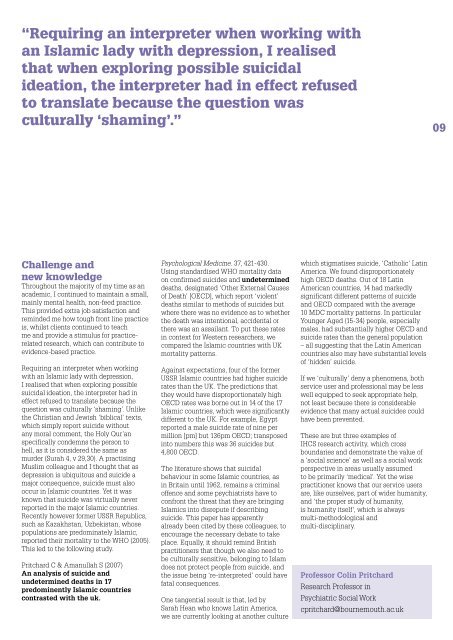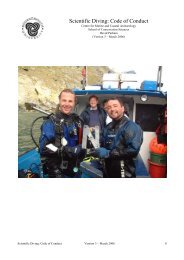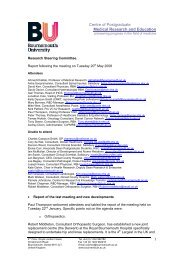Issue 9 (PDF 1.26 mb) - Bournemouth University
Issue 9 (PDF 1.26 mb) - Bournemouth University
Issue 9 (PDF 1.26 mb) - Bournemouth University
Create successful ePaper yourself
Turn your PDF publications into a flip-book with our unique Google optimized e-Paper software.
“Requiring an interpreter when working with<br />
an Islamic lady with depression, I realised<br />
that when exploring possible suicidal<br />
ideation, the interpreter had in effect refused<br />
to translate because the question was<br />
culturally ‘shaming’.”<br />
Challenge and<br />
new knowledge<br />
Throughout the majority of my time as an<br />
academic, I continued to maintain a small,<br />
mainly mental health, non-feed practice.<br />
This provided extra job satisfaction and<br />
reminded me how tough front line practice<br />
is, whilst clients continued to teach<br />
me and provide a stimulus for practicerelated<br />
research, which can contribute to<br />
evidence-based practice.<br />
Requiring an interpreter when working<br />
with an Islamic lady with depression,<br />
I realised that when exploring possible<br />
suicidal ideation, the interpreter had in<br />
effect refused to translate because the<br />
question was culturally ‘shaming’. Unlike<br />
the Christian and Jewish ‘biblical’ texts,<br />
which simply report suicide without<br />
any moral comment, the Holy Qur’an<br />
specifically condemns the person to<br />
hell, as it is considered the same as<br />
murder (Surah 4, v 29,30). A practising<br />
Muslim colleague and I thought that as<br />
depression is ubiquitous and suicide a<br />
major consequence, suicide must also<br />
occur in Islamic countries. Yet it was<br />
known that suicide was virtually never<br />
reported in the major Islamic countries.<br />
Recently however former USSR Republics,<br />
such as Kazakhstan, Uzbekistan, whose<br />
populations are predominately Islamic,<br />
reported their mortality to the WHO (2005).<br />
This led to the following study.<br />
Pritchard C & Amanullah S (2007)<br />
An analysis of suicide and<br />
undetermined deaths in 17<br />
predominently Islamic countries<br />
contrasted with the uk.<br />
Psychological Medicine. 37, 421-430.<br />
Using standardised WHO mortality data<br />
on confirmed suicides and undetermined<br />
deaths, designated ‘Other External Causes<br />
of Death’ [OECD], which report ‘violent’<br />
deaths similar to methods of suicides but<br />
where there was no evidence as to whether<br />
the death was intentional, accidental or<br />
there was an assailant. To put these rates<br />
in context for Western researchers, we<br />
compared the Islamic countries with UK<br />
mortality patterns.<br />
Against expectations, four of the former<br />
USSR Islamic countries had higher suicide<br />
rates than the UK. The predictions that<br />
they would have disproportionately high<br />
OECD rates was borne out in 14 of the 17<br />
Islamic countries, which were significantly<br />
different to the UK. For example, Egypt<br />
reported a male suicide rate of nine per<br />
million [pm] but 136pm OECD; transposed<br />
into nu<strong>mb</strong>ers this was 36 suicides but<br />
4,800 OECD.<br />
The literature shows that suicidal<br />
behaviour in some Islamic countries, as<br />
in Britain until 1962, remains a criminal<br />
offence and some psychiatrists have to<br />
confront the threat that they are bringing<br />
Islamics into disrepute if describing<br />
suicide. This paper has apparently<br />
already been cited by these colleagues, to<br />
encourage the necessary debate to take<br />
place. Equally, it should remind British<br />
practitioners that though we also need to<br />
be culturally sensitive, belonging to Islam<br />
does not protect people from suicide, and<br />
the issue being ‘re-interpreted’ could have<br />
fatal consequences.<br />
One tangential result is that, led by<br />
Sarah Hean who knows Latin America,<br />
we are currently looking at another culture<br />
which stigmatises suicide, ‘Catholic’ Latin<br />
America. We found disproportionately<br />
high OECD deaths. Out of 18 Latin<br />
American countries, 14 had markedly<br />
significant different patterns of suicide<br />
and OECD compared with the average<br />
10 MDC mortality patterns. In particular<br />
Younger Aged (15-34) people, especially<br />
males, had substantially higher OECD and<br />
suicide rates than the general population<br />
– all suggesting that the Latin American<br />
countries also may have substantial levels<br />
of ‘hidden’ suicide.<br />
If we ‘culturally’ deny a phenomena, both<br />
service user and professional may be less<br />
well equipped to seek appropriate help,<br />
not least because there is considerable<br />
evidence that many actual suicides could<br />
have been prevented.<br />
These are but three examples of<br />
IHCS research activity, which cross<br />
boundaries and demonstrate the value of<br />
a ‘social science’ as well as a social work<br />
perspective in areas usually assumed<br />
to be primarily ‘medical’. Yet the wise<br />
practitioner knows that our service users<br />
are, like ourselves, part of wider humanity,<br />
and ‘the proper study of humanity,<br />
is humanity itself’, which is always<br />
multi-methodological and<br />
multi-disciplinary.<br />
Professor Colin Pritchard<br />
Research Professor in<br />
Psychiatric Social Work<br />
cpritchard@bournemouth.ac.uk<br />
09










